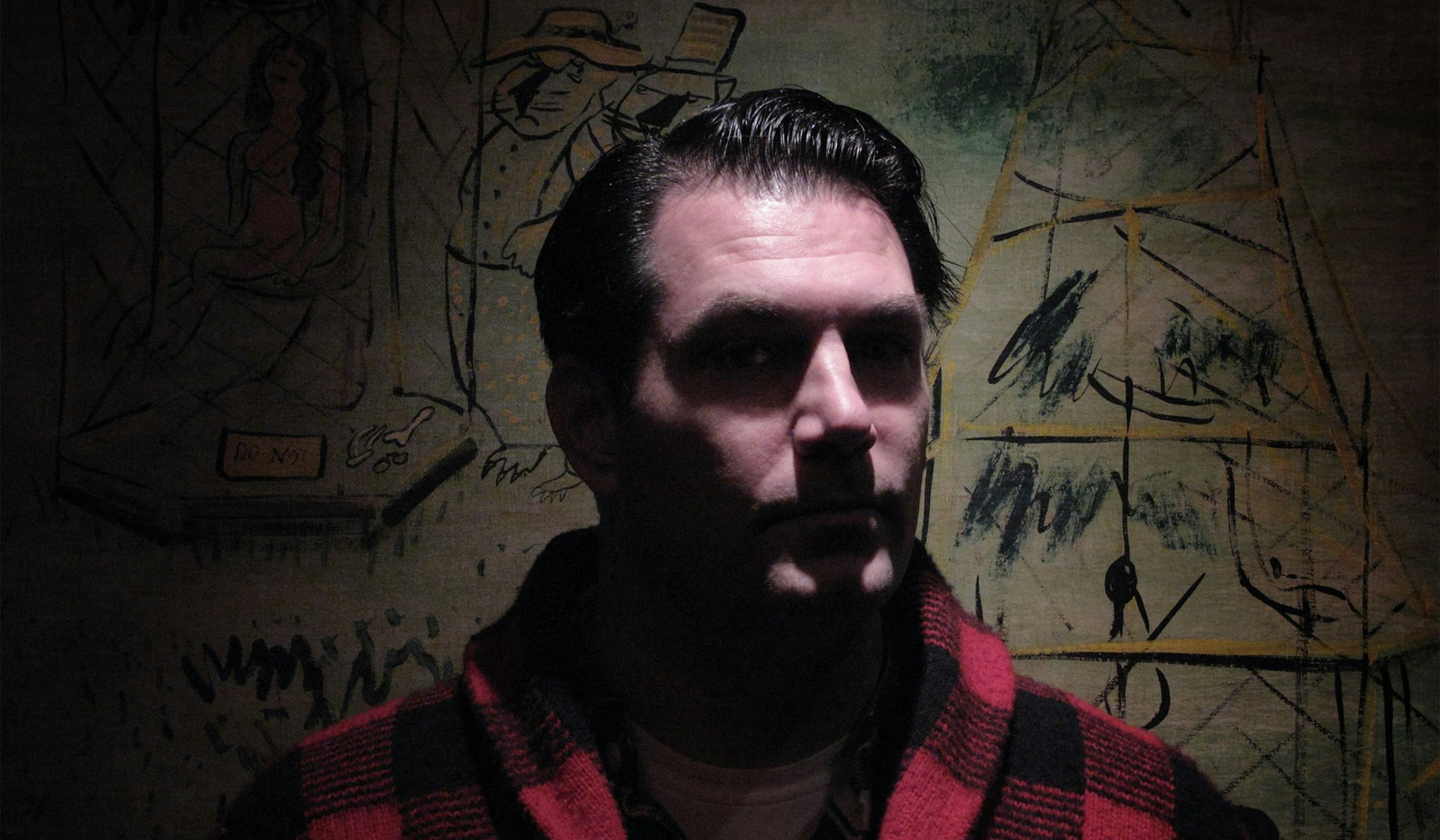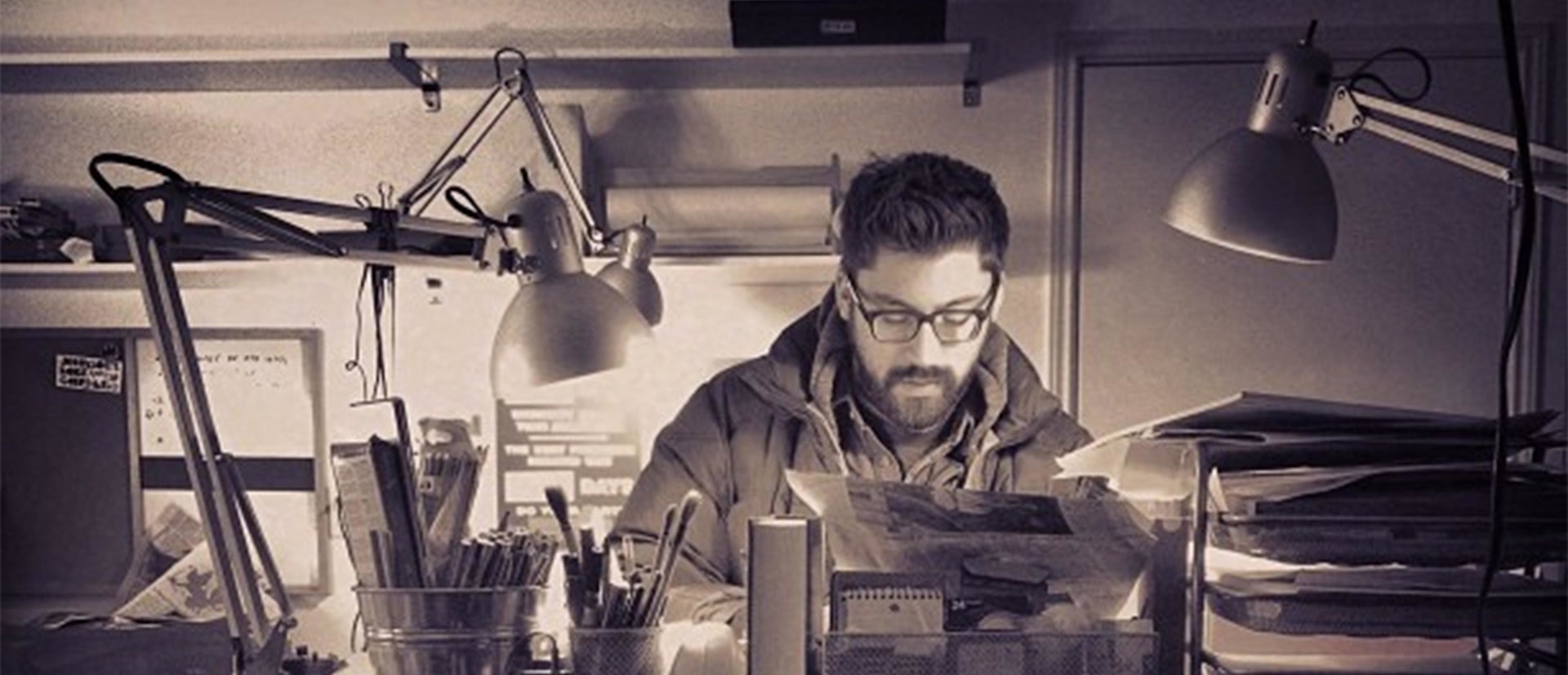
Aaron Fagan
- Text by Alex King
- Photography by Angela Strassheim
Aaron Fagan is a poet. If your mind just shut down and your eyes glazed over, don’t worry, he understands. It happens a lot. But whatever you think about poetry, you’d be wrong to dismiss Aaron Fagan.
There aren’t many poets who invite their readers to trip out, or admit that his poems might not be saying anything at all. And there aren’t many poets who stumbled into their craft via skateboarding.
But Aaron is not a skate poet. Skateboarding merely taught him to see the immense creative potential in the seemingly mundane world around him.
To see what makes Aaron different, head down to see him performing a selection of his poems Friday April 11 at Trans Pecos in Brooklyn with artist Camilla Ha’s live multimedia project Vinka Varna.
How would you describe your poetry in your own words?
That’s not an easy question. Not because I have some elaborate idea of what I make, but because if I knew what I was doing, I don’t think I would make poems. It is the same impulse that drew me to skateboarding. I grew up in a small farm town outside of Rochester, New York. There weren’t any skaters I knew of when I first started. I just had to make things up the best I could. This was back in the 80s.
I bloodied myself trying to learn how to ollie and do other tricks. I had never heard of skate videos and there was no one to teach me, I just tried to imagine how to ride from the still photos in magazines. There is something lost in translation learning that way. You creatively misread and misunderstand things.
The Irish author Samuel Beckett said, “Ever tried. Ever failed. Try again. Fail again. Fail better.” You develop a style of your own through an endless cycle of failures. My relationship with poetry is no different. I suppose my hope is that my poems don’t make any demands, that they invite a reader to trip out, in their own way, on whatever the poems are saying, if they are saying anything at all. I’m not attracted to art that monopolises, commodifies, or colonises the imagination; I like art that incites a riot in the senses.
How did you get into poetry?
It would take a lot of room to trace out what got me into poetry, but it was a number of things other than poetry that lead me to poetry. Skating really informed the way I see the world. It helped me see that there really is no thing that is not art. For most people a parking lot is a parking lot whereas a skater stepping into that same parking lot would see the years it would take to exhaust its creative potential. Language is that parking lot for me.
The easiest answer to how I got into poetry is to say it began as an accident. I just found myself writing one day. Just playing around with words. But then I became like a man possessed, obsessing over measuring their visual, mental, and emotional balance until it all just clicked into place like a puzzle, but what it solved only invented a mystery. I loved the feeling of making something that felt so completely alien to me that I felt I didn’t have any ownership over it. So that first poem was a gateway like the rush of landing a trick for the first time.
How important is the performance element to you?
Not to be negative, but most people’s minds snap shut like a steel trap when you mention poetry. And I get it. “Poetry” is so loaded down with cultural baggage from being taught in such a ridiculous way. The fact people hate poetry so much is part of why I love it so much. Saying to someone that you write poetry, feels like you’ve casually admitted you’re a Satanist, it just doesn’t go over well—you can see and hear the needle scratch across the record in their mind.
When I read in public, it’s in a pretty calm and neutral way. For me it feels like blowing into a balloon, one breath at a time, filling it with pressure and tension to the point where it could explode at any moment but doesn’t. That could be taken as saying my poems are “full of nothing” which is fine. I like the idea of saying “nothing” in a beautiful and horrifying way.
Why did you decide to turn some of your poems into videos?
I wanted to use sound and image with the poems for texture and offer a different, hopefully more inviting, way to experience poetry. I’m not looking for any literal relationship, I just like how the language, the music, and the image correspond with each other like a dialogue.
The interesting thing about making the videos is that it was totally arbitrary. The length of the movies, the length of the poems, and the length of the songs drove it all. I had a few movies I made with my phone and a few I used my phone to film stuff I liked online off my laptop. So that became a collection of images I liked. Then I looked at a bunch of poems I recorded in a friend’s studio back in 2010. If a film and a poem were the same length I just dumped them together and found a piece of music in my music library that was the same length. They are all like these happy accidents to me. They seem harmonised.
How do you hope your poetry will have an impact?
I guess my hope is that I would help poetry and language be seen and experienced as a far more dynamic creative medium than the way it has been handed down to us in this age of distraction.
How does poetry fit into your life?
It is not easy trying to make it as a poet. There is no money in it. That is not an exaggeration. I have a monk-like devotion to what I do, but the trick is how to survive and keep your spirit intact so you can remain open and available to life through art.
I have worked a bunch of jobs to keep my head above water over the years. Recently I started working for Fine Homebuilding magazine, which has brought my publishing and carpentry backgrounds together under one roof. It is work I enjoy with good people and at the end of the workday I am totally free to give myself over to writing.
What are your plans for the future?
I just finished my third book and I have been sending that around to publishers. But looking ahead, I’d like to do more video collaboration with artists and do sound experiments with musicians and explore interesting ways of having the poems interpreted.
I’d like to do readings or representations of the work in a gallery context. I just feel like when you stand in front of a painting no one is telling you how to experience it the way we have been taught to torture some specific meaning out of a work of literature in a book or classroom.
If you could only leave one piece of your poetry behind, which piece would it be?
That’s a really tough question. There is no one poem for me. It is the body of work I have made. One poem that is pretty representative takes its title from a skeptical prompt this guy gave to the behavioural psychologist B.F. Skinner. He said, what is my behaviour if I say “no black scorpion is falling upon this table”? Skinner subsequently wrote the book Verbal Behaviour to explore the varied ways in which meaning is constructed through language—namely context and the radical subjectivities at play.
My poem doesn’t necessitate any knowledge of Skinner’s book, it is just built of a series of juxtaposed images and expressions. I’d say this is the one to leave behind because it points to a lot of the ways of seeing and philosophical and spiritual considerations that interest me personally.
No Black Scorpion is Falling Upon This Table
There is only everything.
Each morning I ask if it’s the same
At different times and if it’s time
To go. Empty the self of self.
Such are the perverse incentives
Of cognitive dissonance. There
She is, silent in a dream I keep
Having where she does this
Elaborate dance number
With a batch of tuxedoed men.
It goes on for hours. Days pass.
I do what I can to not be a danger
To myself and other strangers.
Watch as the world and everything
You love to hate falls away. Way up
High in the sky, no black scorpion
Is falling upon this table. A month
Passes. Like the legal status of a snail,
Number is the ruler of all forms.
I try to teach my children there are
Different kinds of infinity.
Ideas, language, and, of course,
Cogito ergo sum don’t make sense
Anymore. Who would have thought
We could make it rich just for liking things.
It’s the aspect I fail to consider that rules me.
Spacetime is only very slightly curved,
Except near a black hole. So in practice
You would be swimming for billions
Of years before you moved a millimeter.
I feel and imagine without time, but
Damned myself to a language that demands
I express it there. Backscattered light created
A halo around the shadow of the photographer.
We stand out in the crowd, grabbing
At straws to get it done. The witless
Luck of the periphery. We or I
(Should I feel compelled to say “I”)
Bend down on one knee and say,
“Same here, same here. I dream only
Of faceless people, too.” And all the
Monkeys are healthy now and do not
Glow under normal light. I dropped
My phone in the river today, but
At least I was at the river. Deep within
The idea of good and evil, there is
A magnetism that cancels us out.
When the soul draws near that void,
Life is too empty to talk about.
Catch Aaron performing his work Friday April 11 at Trans Pecos in Brooklyn.
Read more of Aaron’s work online or pick up his latest book Echo Train.
